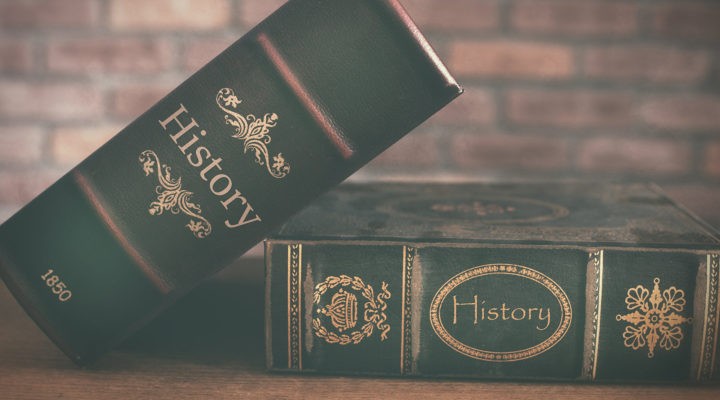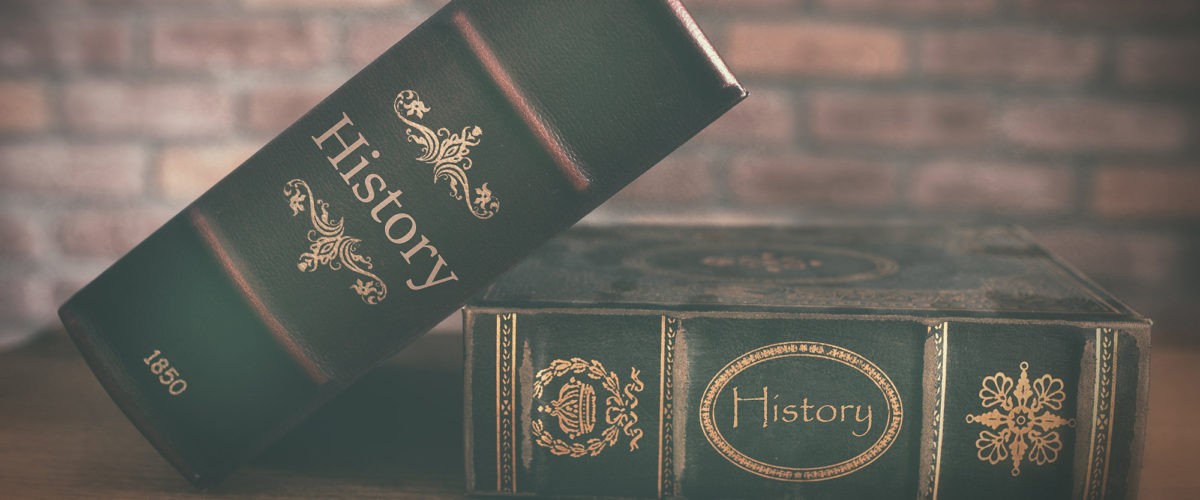Americans remain intensely split over the pace and need for racial healing more than a year after the police killing of George Floyd unleashed massive social and political upheaval, new research shows.
The Pew Research Center also has found deep divisions based on ethnicity, education, political affiliation and age regarding the value of examining the nation’s history of slavery and systemic racism and what healing measures should be taken, including revisiting and rebuilding laws and institutions more equitably.
“Among U.S. adults overall, 53% say increased attention to that history is a good thing for society, while 26% say it is a bad thing and another 21% say it is neither good nor bad,” Pew reported of its Aug. 12 survey, “Deep Divisions in Americans’ Views of Nation’s Racial History — and How to Address It.”
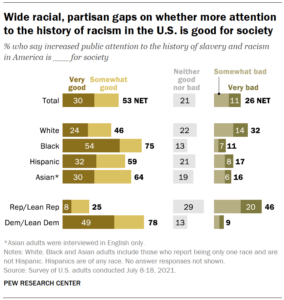 The new report was released in a summer that holds racial tensions of its own. Recent months have seen a rise in white supremacist and Christian nationalist attacks on Black Lives Matter and Critical Race Theory which, like the survey, asks questions about the role of race and racism in the formation of American institutions, laws and policies.
The new report was released in a summer that holds racial tensions of its own. Recent months have seen a rise in white supremacist and Christian nationalist attacks on Black Lives Matter and Critical Race Theory which, like the survey, asks questions about the role of race and racism in the formation of American institutions, laws and policies.
One of the most divisive questions Pew asked respondents to its July 8-18 survey was if it is helpful to the nation to examine its slave and racial history.
“As the country continues to grapple with the issue of race, about half of American adults (53%) say that the ‘increased public attention to the history of slavery and racism’ is good for society, including 30% who say it is very good for society. About a quarter of adults say this increased attention is somewhat bad (14%) or very bad for society (11%). Another 21% say it is neither good nor bad.”
Black adults led in saying the focus on slavery and historic racism is positive for the country, at 75%, including 55% who described it as very good, Pew found.
Among Asians, 64% said examining the history of racism in the U.S. is good for society while 59% of Hispanics expressed that view. Less than half of white adults, at 46%, shared that opinion, while roughly one-third said it is a bad idea. Another 22% were neutral on the question.
Age and education make a difference
Age and education also separate U.S. adults on the value of the historical understanding of slavery and race, Pew said.
“Younger adults hold a more positive view on the public’s increased interest in America’s racial issues than do older people: Two-thirds of adults ages 18 to 29 view the public’s increased attention to the history of slavery and racism as a good thing for society, compared with about half of adults over the age of 30.”
And those who have attained higher levels of formal education were found to be more disposed to increased attention on historic racism in the U.S. than those with less education — at 61% vs. 49%.
“This pattern is evident among both white and Black adults; Hispanic adults with a four-year college degree are about as likely as those who do not have a degree to view the increased attention to the history of slavery and racism as a good thing for society.”
Political leanings also shape views on race
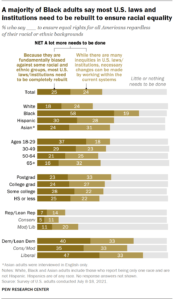 Pew found politics to be another factor. “Just 25% of Republicans and Republican-leaning independents say greater attention to the history of slavery and racism is a good thing; far more (46%) view it negatively, while 29% see it as neither good nor bad,” Pew said. “Democrats and Democratic leaners — across racial and ethnic groups — express overwhelmingly positive views of increased attention to the topic (78% say it is good for society).”
Pew found politics to be another factor. “Just 25% of Republicans and Republican-leaning independents say greater attention to the history of slavery and racism is a good thing; far more (46%) view it negatively, while 29% see it as neither good nor bad,” Pew said. “Democrats and Democratic leaners — across racial and ethnic groups — express overwhelmingly positive views of increased attention to the topic (78% say it is good for society).”
Further divisions exist within those partisan affiliations, Pew reported. For example, Hispanic Republicans were two times more likely than white Republicans to favor increased public scrutiny of racial history, at 42% to 21%.
How to ensure fair treatment?
Pew said it also uncovered stark differences between Americans on the issue of how to ensure fair treatment for Americans, whatever their race or ethnicity.
“Half of all adults say ‘a lot’ more needs to be done to ensure equal rights for all Americans regardless of their race or ethnicity, while about as many say either that a little (34%) or nothing at all (15%) needs to be done.”
But those who said much more needs to be done were split on how to achieve parity, Pew said. “About a quarter of the public (24%) says that while there are many inequities in U.S. laws and institutions, necessary changes can be made by working within the current systems, while roughly as many (25%) say that most laws and major institutions need to be completely rebuilt because they are fundamentally biased against some racial and ethnic groups.”
Almost 80% of African Americans told Pew that more needs to be done to ensure equal rights, including 58% who want to see U.S. laws and institutions overhauled. Just under 20% said the changes can be made by working within existing systems.
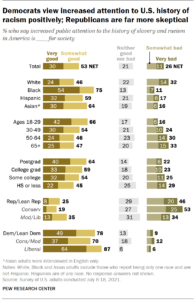 Whites and Republicans, however, have a much dimmer view of the notion of legal and organization reconstruction. Many doubt the need for doing so.
Whites and Republicans, however, have a much dimmer view of the notion of legal and organization reconstruction. Many doubt the need for doing so.
Less than half, at 42%, of white adults said more needs to be done for racial equality in the U.S., and only 18% said laws and institutions need rebuilding. Another 24% said change can be accommodated in current systems.
“Republicans overwhelmingly think only a little (47%) or nothing (30%) needs to be done to ensure equal rights for all Americans, regardless of their racial or ethnic backgrounds,” Pew reported. “Just 22% say a lot more needs to be done, with only 7% saying that most major institutions need to be rebuilt because they are fundamentally biased.”
By contrast, 74% of Democrats agreed more needs to be done to achieve racial equality. “Yet Democrats are divided over whether this will require rebuilding most laws and institutions (40%) or can be achieved working through existing systems (33%).”
Related articles:
New surveys connect the dots between politics, race, religion and vaccination
Majority of Americans believe race relations have worsened in last four years
Films on race can help us have hard conversations | Analysis by Greg Garrett

